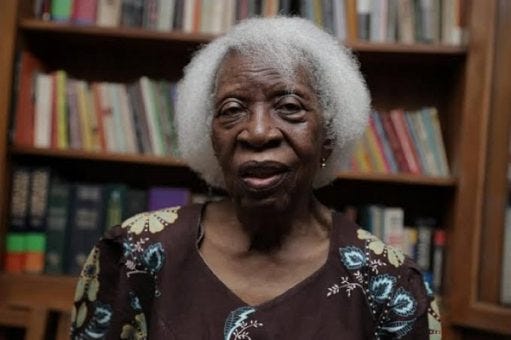Mabel Segun
As a writer, the high point of her writing life was co-winning the Nigeria Prize for Literature in 2007. Sponsored by Nigeria Liquified Natural Gas (NLNG) company, the prize is rated as the biggest literary award in Africa and among the richest literary awards in the world. Her winning work, which was children’s literature titled ‘Readers’ Theatre: Twelve Plays for Young People,’ further cemented her reputation in the genre.
“I got diverted to children’s books because I wanted to raise the genre. I felt that it was a neglected genre,” she said in a 2020 interview to mark her 90th birthday. According to her, “Some think children’s literature is easy to write. They don’t know it’s more difficult than adult literature. This is because you have to go into their minds. To write for children, you have to write for different ages and that’s why it’s difficult.”
Mabel Segun, who died on March 6, aged 95, founded the Children’s Literature Association of Nigeria in 1978 and the Children’s Literature Documentation and Research Centre in 1990 in Ibadan, to promote children-related creative writing and encourage reading among children. She was recognised for her influence on African children’s literature and her role in “the deconstruction of colonial children’s literature for African youth.”
She won her first literary prize in 1954 – the first Nigerian Festival of the Arts Literature Prize. Her winning short story was titled ‘The Surrender’ and published after her university education. She was said to have written, co-authored or edited 12 children’s books, including ‘My Father’s Daughter’ (1965), which was used as a literature text in schools all over the world. She also published poetry for children.
Her body of work includes five books for adults, including a poetry collection, ‘Conflict and Other Poems,’ a collection of short stories, and a selection of her radio talks. Her books have been translated into German, Danish, Norwegian and Greek, and her work is included in the anthology ‘Daughters of Africa’ (1992). She was a founding member of the Association of Nigerian Authors (ANA), established in 1981.
In another interview, she ranked herself within Nigeria’s literary history, saying she was ‘the second Nigerian female to be published abroad.” To buttress her claim, she explained that, in 1954, three poems she wrote were translated into German and published in a German anthology. She had contributed short stories, poems and essays to the Ibadan University College magazine, the ‘University Herald’ (1950-54).
Her path to prominence as a writer was a tough one. “My first husband burnt my first yet-to-be-published novel because he did not want me to become famous. Luckily for me, it was a white judge while we were in England who presided over the case. He dissolved the marriage,” she said in an interview in 1998.
Born in Ondo, in present-day Ondo State, she studied English, Latin and History at the University College, Ibadan, and graduated in 1953. She later trained as an editor and public relations practitioner in the United Kingdom and America.
She had stints in the country’s public and private sectors and was Chief Federal Inspector of Education in 1982 and Senior Research Fellow, Institute of African Studies, University of Ibadan, from 1982 to 1989. She did various jobs, but her writing was constant.
In 2009, she received the Nigerian National Order of Merit Award (NNOM) for lifetime achievements. Her selection for the prestigious award, the highest academic award in the country given by the Nigerian government, spoke volumes about her outstanding contributions.
Segun also made history as the first Nigerian female table tennis player in 1951. She played table tennis at university and national levels, and also played badminton. Her triumphs included silver medal, first ever ladies singles, Lagos, 1954; gold medal, national women’s doubles and mixed doubles, Enugu, 1963; gold medal, women’s team event, West African Games, Cotonou, 1964; and bronze medal, first all-Nigerian badminton women’s singles, Lagos.
In recognition of her various contributions, the Nigerian government, in 2004, conferred on her the national honour, Officer of the Order of the Federal Republic (OFR).
She will be remembered as a populariser of children’s literature and for her contribution to literary enterprise in the country.
The Nation Newspaper Ltd.



